2024年牛津深圳·广州版中考英语解题技巧点拨课件—阅读理解 (五)(主旨大意题)
文档属性
| 名称 | 2024年牛津深圳·广州版中考英语解题技巧点拨课件—阅读理解 (五)(主旨大意题) |  | |
| 格式 | pptx | ||
| 文件大小 | 3.2MB | ||
| 资源类型 | 试卷 | ||
| 版本资源 | 牛津深圳版 | ||
| 科目 | 英语 | ||
| 更新时间 | 2024-04-22 11:47:55 | ||
图片预览

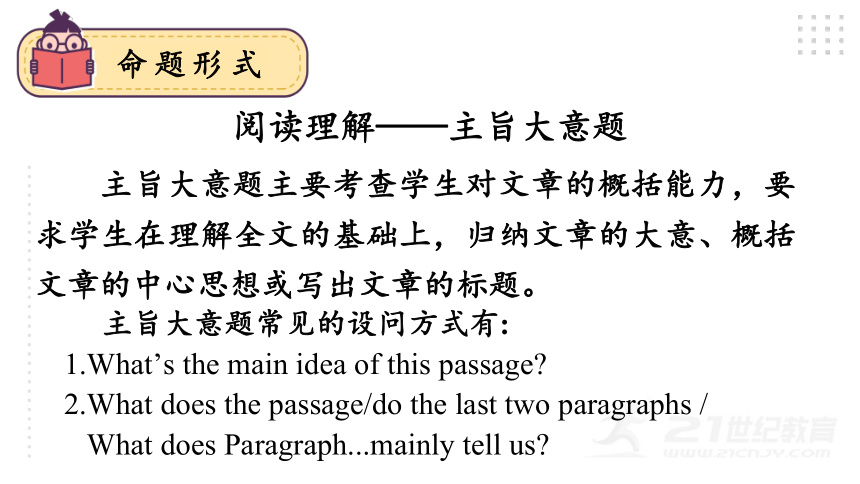
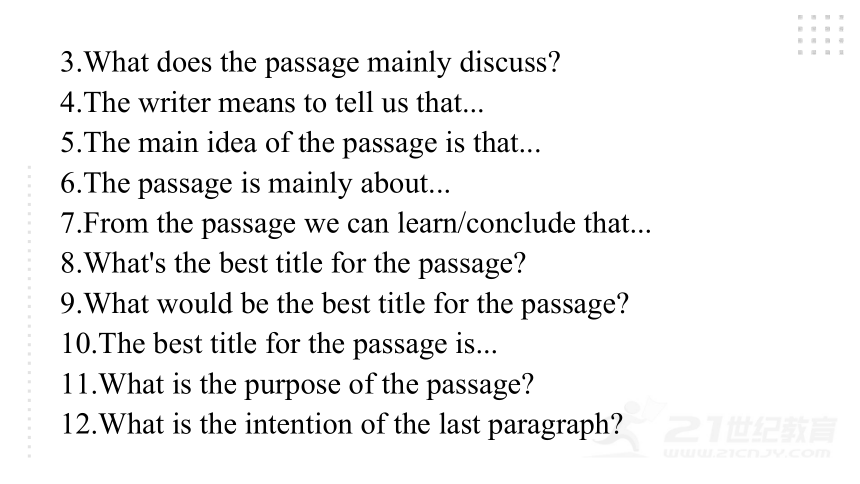
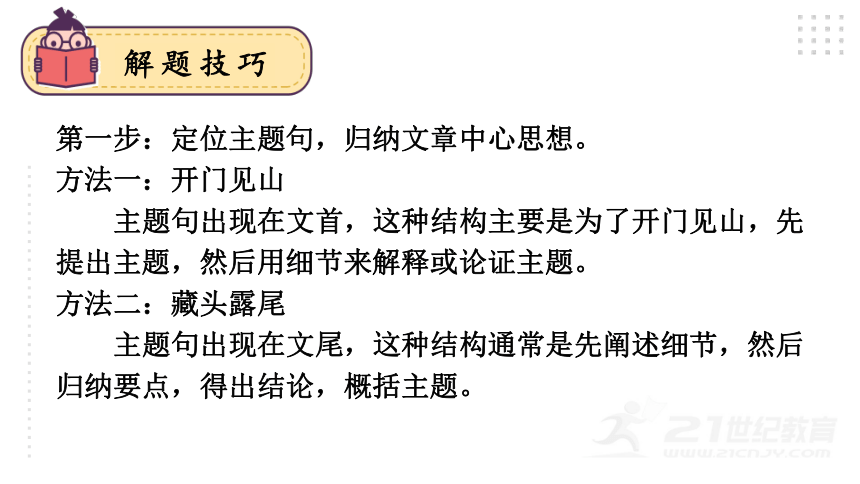
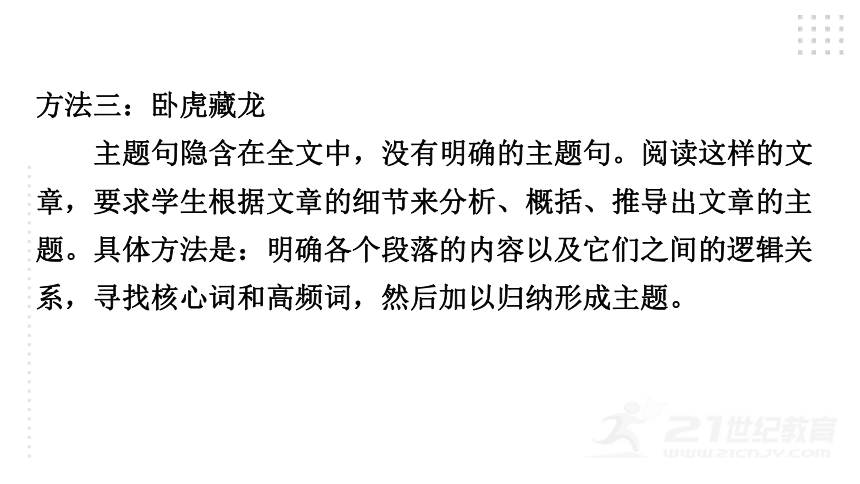
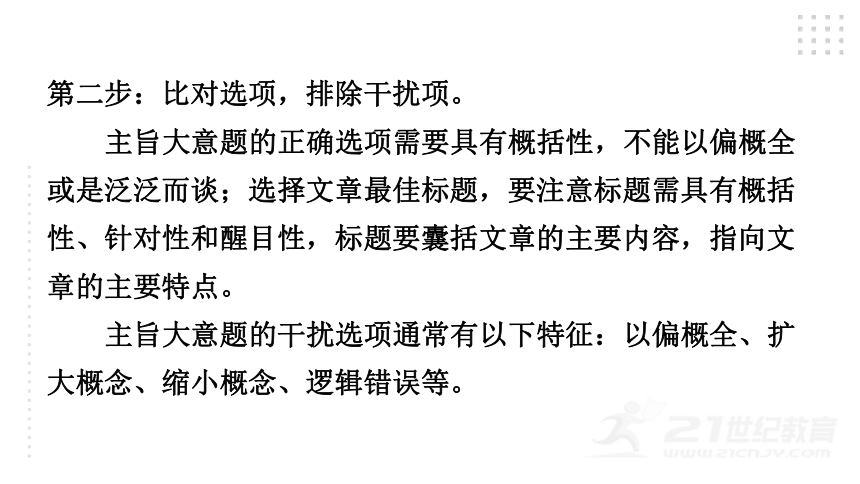

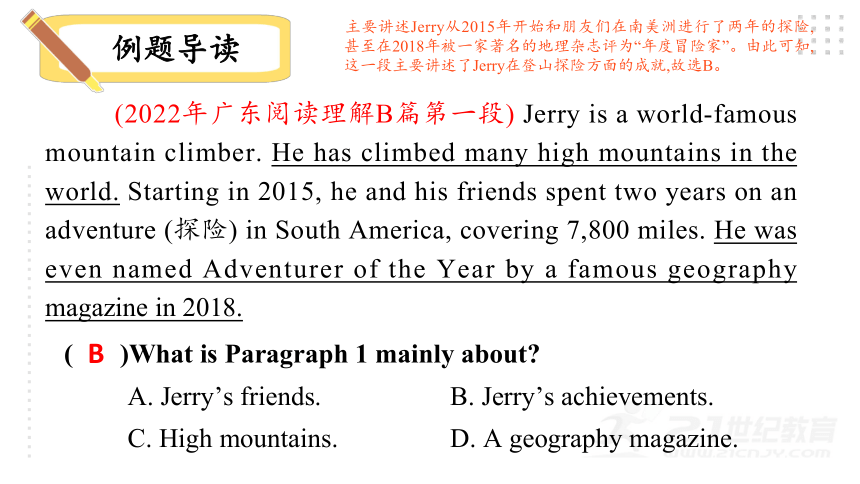
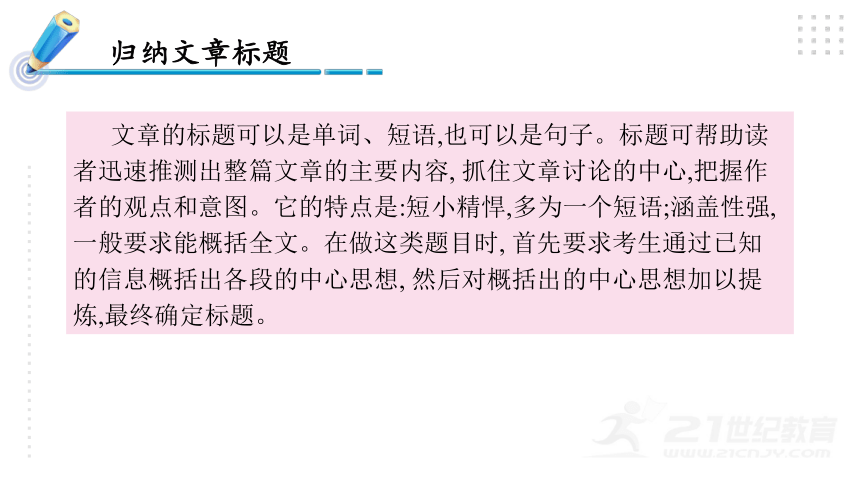
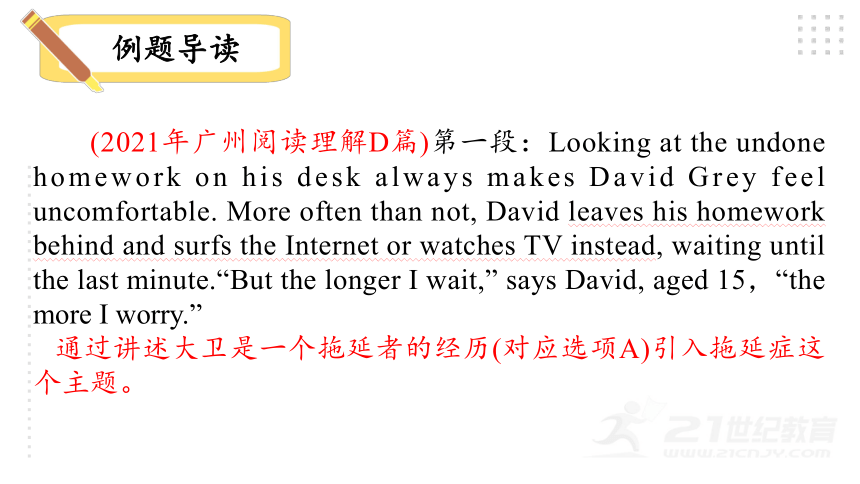
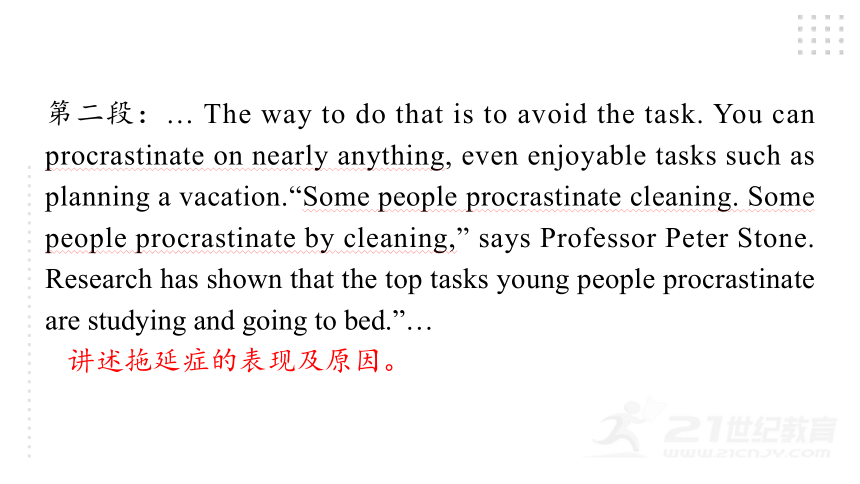
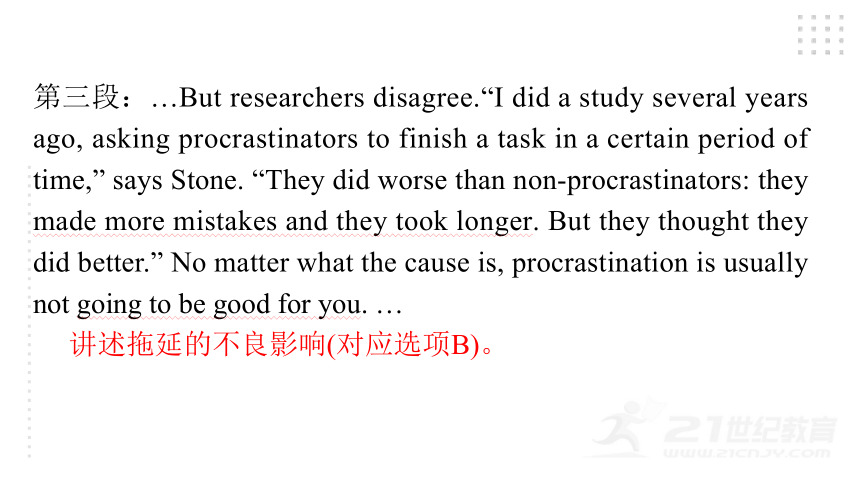
文档简介
(共38张PPT)
阅读理解
解题技巧点拨 (五)
牛津深圳·广州版 九年级
主旨大意题主要考查学生对文章的概括能力,要求学生在理解全文的基础上,归纳文章的大意、概括文章的中心思想或写出文章的标题。
阅读理解——主旨大意题
命题形式
主旨大意题常见的设问方式有:
1.What’s the main idea of this passage
2.What does the passage/do the last two paragraphs /
What does Paragraph...mainly tell us
3.What does the passage mainly discuss
4.The writer means to tell us that...
5.The main idea of the passage is that...
6.The passage is mainly about...
7.From the passage we can learn/conclude that...
8.What's the best title for the passage
9.What would be the best title for the passage
10.The best title for the passage is...
11.What is the purpose of the passage
12.What is the intention of the last paragraph
第一步:定位主题句,归纳文章中心思想。
方法一:开门见山
主题句出现在文首,这种结构主要是为了开门见山,先提出主题,然后用细节来解释或论证主题。
方法二:藏头露尾
主题句出现在文尾,这种结构通常是先阐述细节,然后归纳要点,得出结论,概括主题。
解题技巧
方法三:卧虎藏龙
主题句隐含在全文中,没有明确的主题句。阅读这样的文章,要求学生根据文章的细节来分析、概括、推导出文章的主题。具体方法是:明确各个段落的内容以及它们之间的逻辑关系,寻找核心词和高频词,然后加以归纳形成主题。
第二步:比对选项,排除干扰项。
主旨大意题的正确选项需要具有概括性,不能以偏概全或是泛泛而谈;选择文章最佳标题,要注意标题需具有概括性、针对性和醒目性,标题要囊括文章的主要内容,指向文章的主要特点。
主旨大意题的干扰选项通常有以下特征:以偏概全、扩大概念、缩小概念、逻辑错误等。
解答该题型的关键是找出主题句,把握文章主旨。主题句多在文章的开头或结尾,有时出现在中间。概括大意一般是先看首尾或各段开头, 再看全文找主题句,若无明显主题句,可通过关键词来概括。文中出现两种或两种以上的不同观点时,务必牢记作者的观点才是体现全文中心的。此时, 要注意一些表转折或让步的词,如but, yet, however, although等。文章中出现表示相反意义的观点时, 往往会用到这些词。答题时,要弄清哪个是作者的观点,排查迷惑性信息,准确归纳主旨大意。
归纳文章或段落大意
例题导读
(2022年广东阅读理解B篇第一段) Jerry is a world-famous mountain climber. He has climbed many high mountains in the world. Starting in 2015, he and his friends spent two years on an adventure (探险) in South America, covering 7,800 miles. He was even named Adventurer of the Year by a famous geography magazine in 2018.
( )What is Paragraph 1 mainly about
A. Jerry’s friends. B. Jerry’s achievements.
C. High mountains. D. A geography magazine.
主要讲述Jerry从2015年开始和朋友们在南美洲进行了两年的探险,甚至在2018年被一家著名的地理杂志评为“年度冒险家”。由此可知,这一段主要讲述了Jerry在登山探险方面的成就,故选B。
B
文章的标题可以是单词、短语,也可以是句子。标题可帮助读者迅速推测出整篇文章的主要内容, 抓住文章讨论的中心,把握作者的观点和意图。它的特点是:短小精悍,多为一个短语;涵盖性强, 一般要求能概括全文。在做这类题目时, 首先要求考生通过已知的信息概括出各段的中心思想, 然后对概括出的中心思想加以提炼,最终确定标题。
归纳文章标题
例题导读
(2021年广州阅读理解D篇)第一段:Looking at the undone homework on his desk always makes David Grey feel uncomfortable. More often than not, David leaves his homework behind and surfs the Internet or watches TV instead, waiting until the last minute.“But the longer I wait,” says David, aged 15,“the more I worry.”
通过讲述大卫是一个拖延者的经历(对应选项A)引入拖延症这个主题。
第二段:… The way to do that is to avoid the task. You can procrastinate on nearly anything, even enjoyable tasks such as planning a vacation.“Some people procrastinate cleaning. Some people procrastinate by cleaning,” says Professor Peter Stone. Research has shown that the top tasks young people procrastinate are studying and going to bed.”…
讲述拖延症的表现及原因。
第三段:…But researchers disagree.“I did a study several years ago, asking procrastinators to finish a task in a certain period of time,” says Stone. “They did worse than non-procrastinators: they made more mistakes and they took longer. But they thought they did better.” No matter what the cause is, procrastination is usually not going to be good for you. …
讲述拖延的不良影响(对应选项B)。
第四段至第五段:For those who need some drives to stop procrastinating, the best advice might be to take action first. If you've been procrastinating on forming a habit of exercise, just put on your walking shoes. A little bit of progress will get you moving. Next, find something to help you remember to take action.…
讲述防止拖延症的方法。
( ) What can be the best title of this passage
A. A Day of a Procrastinator (以偏概全)
B. Procrastination: Yes or No?(以偏概全)
C. Say Goodbye to Procrastination (这篇文章旨在让我们对抗拖延症,符合主旨)
D. Want to Feel Good Now Procrastinate!(黑白颠倒)
B
语篇训练1
We may all hear the famous Chinese song Jasmine Flower. The jasmine tea is also very popular. Many people like to drink it.
Chen Chengzhong is good at making the jasmine tea. He is 72 years old. He started his career early in his teenage years. At that time, he was a worker in a tea factory. Little by little, he fell in love with making the jasmine tea.
Jasmine tea has fresh aroma(芳香).“Our jasmine flowers and tea leaves are all from Fujian Province,although they are more expensive than those from other places,”Chen said. “What we make is true Fuzhou jasmine tea.”
For Chen and his team, summer nights make them think of hard work, as jasmine usually comes out at night. But they don't regret doing this thing. They hope that this traditional skill can be known by more people.
( ) What can be the best title of this passage
A. Popular Jasmine Tea
B. The Famous Chinese Song
C. A Hard-working Tea Maker
D. The History of a Tea Factory
A
语篇训练2
One way you can tell if an animal is sleeping is by studying its brainwaves. When human beings or other mammals (哺乳动物) fall asleep, the pattern of their brainwaves changes.
Mammals’ brains are different from fish’s brains. Humans and other mammals have complex (复杂的) brains. A fish’s brain is much less complex than a mammal’s brain. A fish’s brainwaves don’t change when the fish is asleep. This means that we can’t tell if a fish is sleeping by looking at its brainwaves.
Although fish may not sleep like people, they do rest. One way to tell if a fish is resting is to watch what it is doing. Most fish will slow down when they are resting.
If you have ever had a pet fish, you might have noticed that it will rest near the bottom of the tank for a few hours every night. When the fish rests, it makes very small movements to keep itself in one place.
Another way to tell that a fish is resting is to watch how it
reacts to things that happen to it. When a fish is resting, it will
react much more slowly. Several years ago, a group of scientists
studied the sleeping habits of zebra fish. They gave the zebra fish
mild (温和的) electric shocks when they were fully awake and while they were resting. If you have a pet fish at home, you can try a similar experiment. Try giving your fish some food when it is resting. It should take much longer for the fish to notice that there is food in its tank than it does when the fish is fully awake.
( ) What’s the best title for the passage
A. Do fish sleep at night
B. Fun facts of fish.
C. How to know if a fish is resting
D. Eating habits of fish.
C
语篇训练3
In 1959, when Jean Harper was in the third grade, her teacher asked them to write a report on what they wanted to be when they grew up. She poured her heart into her report and expressed her dream of becoming an airline pilot. Her paper came back with an “F” on it. The teacher told her it was a “fairy tale”. Jean was completely disappointed. As the years went by, Jean was beaten down by the discouragement. “Girls can’t become airline pilots; never have, never will. You’re crazy.” Finally Jean gave up.
In her senior year of high school, her English teacher was Mrs Dorothy Slaton, a strict teacher with high standards. One day, Mrs Slaton asked this question, “What will you do in the future ” Jean felt a rush of the old enthusiasm (热情), and with excitement she wrote down the very old dream right away.
The next thing that Mrs Slaton said changed the course of Jean’s life. “I have a little secret for you. You do have unlimited (无限的) abilities and talents. When you leave school, if you don’t go for your dream, no one will do it for you. You can have what you want if you try!”
The hurt and fear of years of discouragement disappeared suddenly. Jean felt thrilled and told her teacher about her dream of becoming a pilot. Mrs Slaton slapped (敲) the desk top and said, “Then do it!”
So Jean did. It didn’t happen overnight. In her 10 years of hard work, even facing all kinds of difficulties, she never gave up her dream.
Eventually, Jean Harper became a Boeing 737 captain (机长) of the United Airline Company.
( ) What’s the best title for the passage?
A. Face Difficulties B. Dream
C. How to Achieve Your Dream D. Go for Your Dream
D
语篇训练4
Chinese cultures have passed on for thousands of years, and goldfish have been recorded for nearly two thousand years. A report from the Jin Dynasty described “red fish” swimming in the Red River. Goldfish were widely mentioned in the Tang Dynasty poems. They were collected in the ponds(池塘) by rich people at that time.
During the Song Dynasty, a ruler built a pond in Hangzhou to raise goldfish. It marked the time when people began to raise them. However, owning yellow goldfish was not allowed because that color was thought to be a symbol of the mon people were forced to raise orange ones, which is probably why that color is more common today.
Until the invention of the goldfish bowl in the Ming Dynasty, goldfish were always seen to live outdoors in ponds. The goldfish bowl allowed more people to keep goldfish and interested people in raising more beautiful kinds such as the “lion head” that could not live outdoors. Goldfish traveled to Japan in 1502, Europe in 1611, and the United States in the early 1800s.
Chinese people have expressed good wishes through images(形象) of animals, plants and other objects. Chinese has many homophones, and these homophones connect images of objects with special good wishes that sound the same. The Chinese word for “fish” is a homophone of the word for “more”, so fish express wishes for “owning more”. The goldfish, however, also has the word for “gold”, so goldfish images express wishes for “owning more wealth”.
( ) Which can be the best title for the passage
A. Fish of Wealth and Good Wishes
B. The Ways of Raising Goldfish
C. Fish Widely Recorded in Poems
D. The Present Situation of Goldfish
Goldfish competitions, which began in Beijing during the Ming Dynasty, continue in China. Even in Hong Kong, there is a busy goldfish market to meet the modern requirement of the fish of wealth and good wishes.
A
语篇训练5
Amy walked toward Miss Brown's backyard, where she was planting roses. Last week, Amy and her parents just moved into the house next door.
The old woman looked up, “Why the long face, Amy ”
“There aren't any kids around to play with,” said Amy. “I have nothing to do.”
Miss Brown smiled, “You sound just like a girl who used to live here.”
“Really Who ”
“Her name is Rachel,” said Miss Brown. “Too bad you two young girls couldn't have lived here at the same time.”
“What did Rachel do when she was bored ” asked Amy.
“She planted a flower garden,” answered Miss Brown.
Amy looked at Miss Brown's roses. “Could I, too ”
Miss Brown handed Amy some tools and roses. “This will get you started.”
“Thanks,” said Amy.
Amy worked hard the whole afternoon in her garden. When she saw the lovely roses planted, she smiled. Still, it was too bad that Rachel wasn't there.
The next day, Amy watered her roses and walked to Miss Brown's backyard, where she sat reading. “What else did Rachel do ” asked Amy.
“She wrote poems in her flower garden,” Miss Brown answered. “One of her poems even won a prize in a school competition.”
Amy closed her eyes. “How good it would feel, but I don't know how to write poems,” she said. Miss Brown smiled, “The best way is to read poems first.” She handed Amy her book. “Thanks,” said Amy.
Amy lay on her stomach next to her roses and read. Then she started to write. That night she had a poem that might not be a prizewinner but sounded good enough. Still, it was too bad that Rachel wasn't there.
The third day, Amy watered her flowers, wrote a new poem, and then walked to Miss Brown again. “What else did Rachel do ” asked Amy. “She played in the attic(阁楼). Come with me,” Miss Brown invited. “Thanks!” said Amy.
“Make yourself at home,” Miss Brown said and left Amy to search alone there. Then Amy found a trophy(奖杯) with these words—First Prize in Poetry. Rachel Brown.1937.
Slowly, a smile spread across her face. Amy ran back to Miss Brown, “I wonder if Rachel would like to write poems in my flower garden.” Miss Brown smiled, “I think she would love to.”
( ) Which is the main lesson of the story
A. Having shared interests is important to a real friendship.
B. Working in the garden is the best way to fight loneliness.
C. Parents should think twice before moving to a new place.
D. It is difficult for children to make friends with grown-ups.
A
语篇训练6
When I was a girl growing up, I cannot once ever remember either my mum or my grandma wasting food.
Anything we didn't eat at one meal was leftovers(剩菜). I can remember my grandma making a huge pot of potatoes. We would all eat until we were full enough, but there were always about half of the potatoes left over. A few days later, Grandma would take those potatoes out of the fridge, boil some noodles, add some vegetables and mix them all together. And I also remember when I watched my mum fry bacon(煎培根) for us in the mornings, she would always take the oil carefully and pour it into a bottle. Then she would use it later to add flavor to so many other dishes. I was an adult before I realized that potatoes didn't actually taste like bacon!
I learned their lessons well, and after I grew up, I tried to never waste food myself. I always planned the week's meals ahead of time and only bought what was on my shopping list so that nothing went to waste. Every meal went into our stomachs and any leftovers were later eaten by either myself, my boys, my husband or my dogs. To me, throwing food into the bin was just wrong.
However, when it comes to living, there are no leftovers. Life is just like a feast. Each moment that you don't live is lost forever. Life cannot be saved or stored. Each day is a fresh beginning. Live each moment of your life to the fullest, then.
( ) What can we learn from the last two paragraphs
A. It is never too old to learn.
B. Eat to live, but not live to eat.
C. Neither food nor life should be wasted.
D. There is no such thing as a free lunch.
C
语篇训练7
“Amy! Milk!” Mama called.
Milk. It was Amy's turn to get it. Amy sighed and shut her first-aid(急救) book.
Amy tied the cow close to a tree. Somewhere down the mountain, some volunteer doctors were teaching medical skills to village nurses. Amy heard Betty drive off hours ago. “She should have taken me with her. She thinks I'm too young,” Amy thought. “But she's wrong. I am already 15!”
Amy carried the milk back to Mama, and then wandered up the road. Roy, a village boy, was trying to stand on a horse's back. “No wonder they don't trust kids with anything important,” Amy thought.
She had just turned away when she heard a heavy fall and a few cries. Roy was on the ground. “Roy!” The kids nearby ran towards him. “Get Betty,” one said. Amy shook her head. “Betty's gone to the city.”
The kids didn't know what to do. Amy ran to Roy and saw one of his legs out of shape. A broken leg! She remembered what the first-aid book said about it.
“Victor!” Amy called to one of the boys. “Go get Roy's mama, and find someone with a truck.”She turned to the others. “Give me your shirts. We need something to tie his leg with.”
Amy then found a strong, straight stick. She carefully wrapped the shirts around Roy's leg and the stick. Roy cried out in pain. “I know it hurts,” Amy said softly. “But this will hold it still until you get to the hospital.”
When Amy was done, she looked up and saw Roy's mama and a man watching beside a truck. “Thank you, Amy,” Roy's mama said. Amy helped them lift Roy into the truck, and then they drove down the hillside towards the hospital.
The next day, Betty came to Amy's home. “I heard what you did,” Betty said. “You kept your head in an emergency. That's an important skill.”
Amy's face turned red. “I was afraid...”
Betty shook her head. “It's OK for a nurse to be afraid, as long as she has a clear head. The volunteer doctors are coming tomorrow with vaccines. We need some more hands. Can you help ”
“I'd love to.” Amy replied at once.
“Come early, then. There is a lot to learn.”
Amy smiled. “I'll bring my first-aid book.”
( ) Which sentence best describes a lesson from the story
A. Only trained doctors and nurses can provide first-aid.
B. Knowledge from books can help solve real-life problems.
C. Children need enough practice before they can be helpful.
D. Helping with housework is important to children's health.
B
谢谢
21世纪教育网(www.21cnjy.com)
中小学教育资源网站
兼职招聘:
https://www.21cnjy.com/recruitment/home/admin
阅读理解
解题技巧点拨 (五)
牛津深圳·广州版 九年级
主旨大意题主要考查学生对文章的概括能力,要求学生在理解全文的基础上,归纳文章的大意、概括文章的中心思想或写出文章的标题。
阅读理解——主旨大意题
命题形式
主旨大意题常见的设问方式有:
1.What’s the main idea of this passage
2.What does the passage/do the last two paragraphs /
What does Paragraph...mainly tell us
3.What does the passage mainly discuss
4.The writer means to tell us that...
5.The main idea of the passage is that...
6.The passage is mainly about...
7.From the passage we can learn/conclude that...
8.What's the best title for the passage
9.What would be the best title for the passage
10.The best title for the passage is...
11.What is the purpose of the passage
12.What is the intention of the last paragraph
第一步:定位主题句,归纳文章中心思想。
方法一:开门见山
主题句出现在文首,这种结构主要是为了开门见山,先提出主题,然后用细节来解释或论证主题。
方法二:藏头露尾
主题句出现在文尾,这种结构通常是先阐述细节,然后归纳要点,得出结论,概括主题。
解题技巧
方法三:卧虎藏龙
主题句隐含在全文中,没有明确的主题句。阅读这样的文章,要求学生根据文章的细节来分析、概括、推导出文章的主题。具体方法是:明确各个段落的内容以及它们之间的逻辑关系,寻找核心词和高频词,然后加以归纳形成主题。
第二步:比对选项,排除干扰项。
主旨大意题的正确选项需要具有概括性,不能以偏概全或是泛泛而谈;选择文章最佳标题,要注意标题需具有概括性、针对性和醒目性,标题要囊括文章的主要内容,指向文章的主要特点。
主旨大意题的干扰选项通常有以下特征:以偏概全、扩大概念、缩小概念、逻辑错误等。
解答该题型的关键是找出主题句,把握文章主旨。主题句多在文章的开头或结尾,有时出现在中间。概括大意一般是先看首尾或各段开头, 再看全文找主题句,若无明显主题句,可通过关键词来概括。文中出现两种或两种以上的不同观点时,务必牢记作者的观点才是体现全文中心的。此时, 要注意一些表转折或让步的词,如but, yet, however, although等。文章中出现表示相反意义的观点时, 往往会用到这些词。答题时,要弄清哪个是作者的观点,排查迷惑性信息,准确归纳主旨大意。
归纳文章或段落大意
例题导读
(2022年广东阅读理解B篇第一段) Jerry is a world-famous mountain climber. He has climbed many high mountains in the world. Starting in 2015, he and his friends spent two years on an adventure (探险) in South America, covering 7,800 miles. He was even named Adventurer of the Year by a famous geography magazine in 2018.
( )What is Paragraph 1 mainly about
A. Jerry’s friends. B. Jerry’s achievements.
C. High mountains. D. A geography magazine.
主要讲述Jerry从2015年开始和朋友们在南美洲进行了两年的探险,甚至在2018年被一家著名的地理杂志评为“年度冒险家”。由此可知,这一段主要讲述了Jerry在登山探险方面的成就,故选B。
B
文章的标题可以是单词、短语,也可以是句子。标题可帮助读者迅速推测出整篇文章的主要内容, 抓住文章讨论的中心,把握作者的观点和意图。它的特点是:短小精悍,多为一个短语;涵盖性强, 一般要求能概括全文。在做这类题目时, 首先要求考生通过已知的信息概括出各段的中心思想, 然后对概括出的中心思想加以提炼,最终确定标题。
归纳文章标题
例题导读
(2021年广州阅读理解D篇)第一段:Looking at the undone homework on his desk always makes David Grey feel uncomfortable. More often than not, David leaves his homework behind and surfs the Internet or watches TV instead, waiting until the last minute.“But the longer I wait,” says David, aged 15,“the more I worry.”
通过讲述大卫是一个拖延者的经历(对应选项A)引入拖延症这个主题。
第二段:… The way to do that is to avoid the task. You can procrastinate on nearly anything, even enjoyable tasks such as planning a vacation.“Some people procrastinate cleaning. Some people procrastinate by cleaning,” says Professor Peter Stone. Research has shown that the top tasks young people procrastinate are studying and going to bed.”…
讲述拖延症的表现及原因。
第三段:…But researchers disagree.“I did a study several years ago, asking procrastinators to finish a task in a certain period of time,” says Stone. “They did worse than non-procrastinators: they made more mistakes and they took longer. But they thought they did better.” No matter what the cause is, procrastination is usually not going to be good for you. …
讲述拖延的不良影响(对应选项B)。
第四段至第五段:For those who need some drives to stop procrastinating, the best advice might be to take action first. If you've been procrastinating on forming a habit of exercise, just put on your walking shoes. A little bit of progress will get you moving. Next, find something to help you remember to take action.…
讲述防止拖延症的方法。
( ) What can be the best title of this passage
A. A Day of a Procrastinator (以偏概全)
B. Procrastination: Yes or No?(以偏概全)
C. Say Goodbye to Procrastination (这篇文章旨在让我们对抗拖延症,符合主旨)
D. Want to Feel Good Now Procrastinate!(黑白颠倒)
B
语篇训练1
We may all hear the famous Chinese song Jasmine Flower. The jasmine tea is also very popular. Many people like to drink it.
Chen Chengzhong is good at making the jasmine tea. He is 72 years old. He started his career early in his teenage years. At that time, he was a worker in a tea factory. Little by little, he fell in love with making the jasmine tea.
Jasmine tea has fresh aroma(芳香).“Our jasmine flowers and tea leaves are all from Fujian Province,although they are more expensive than those from other places,”Chen said. “What we make is true Fuzhou jasmine tea.”
For Chen and his team, summer nights make them think of hard work, as jasmine usually comes out at night. But they don't regret doing this thing. They hope that this traditional skill can be known by more people.
( ) What can be the best title of this passage
A. Popular Jasmine Tea
B. The Famous Chinese Song
C. A Hard-working Tea Maker
D. The History of a Tea Factory
A
语篇训练2
One way you can tell if an animal is sleeping is by studying its brainwaves. When human beings or other mammals (哺乳动物) fall asleep, the pattern of their brainwaves changes.
Mammals’ brains are different from fish’s brains. Humans and other mammals have complex (复杂的) brains. A fish’s brain is much less complex than a mammal’s brain. A fish’s brainwaves don’t change when the fish is asleep. This means that we can’t tell if a fish is sleeping by looking at its brainwaves.
Although fish may not sleep like people, they do rest. One way to tell if a fish is resting is to watch what it is doing. Most fish will slow down when they are resting.
If you have ever had a pet fish, you might have noticed that it will rest near the bottom of the tank for a few hours every night. When the fish rests, it makes very small movements to keep itself in one place.
Another way to tell that a fish is resting is to watch how it
reacts to things that happen to it. When a fish is resting, it will
react much more slowly. Several years ago, a group of scientists
studied the sleeping habits of zebra fish. They gave the zebra fish
mild (温和的) electric shocks when they were fully awake and while they were resting. If you have a pet fish at home, you can try a similar experiment. Try giving your fish some food when it is resting. It should take much longer for the fish to notice that there is food in its tank than it does when the fish is fully awake.
( ) What’s the best title for the passage
A. Do fish sleep at night
B. Fun facts of fish.
C. How to know if a fish is resting
D. Eating habits of fish.
C
语篇训练3
In 1959, when Jean Harper was in the third grade, her teacher asked them to write a report on what they wanted to be when they grew up. She poured her heart into her report and expressed her dream of becoming an airline pilot. Her paper came back with an “F” on it. The teacher told her it was a “fairy tale”. Jean was completely disappointed. As the years went by, Jean was beaten down by the discouragement. “Girls can’t become airline pilots; never have, never will. You’re crazy.” Finally Jean gave up.
In her senior year of high school, her English teacher was Mrs Dorothy Slaton, a strict teacher with high standards. One day, Mrs Slaton asked this question, “What will you do in the future ” Jean felt a rush of the old enthusiasm (热情), and with excitement she wrote down the very old dream right away.
The next thing that Mrs Slaton said changed the course of Jean’s life. “I have a little secret for you. You do have unlimited (无限的) abilities and talents. When you leave school, if you don’t go for your dream, no one will do it for you. You can have what you want if you try!”
The hurt and fear of years of discouragement disappeared suddenly. Jean felt thrilled and told her teacher about her dream of becoming a pilot. Mrs Slaton slapped (敲) the desk top and said, “Then do it!”
So Jean did. It didn’t happen overnight. In her 10 years of hard work, even facing all kinds of difficulties, she never gave up her dream.
Eventually, Jean Harper became a Boeing 737 captain (机长) of the United Airline Company.
( ) What’s the best title for the passage?
A. Face Difficulties B. Dream
C. How to Achieve Your Dream D. Go for Your Dream
D
语篇训练4
Chinese cultures have passed on for thousands of years, and goldfish have been recorded for nearly two thousand years. A report from the Jin Dynasty described “red fish” swimming in the Red River. Goldfish were widely mentioned in the Tang Dynasty poems. They were collected in the ponds(池塘) by rich people at that time.
During the Song Dynasty, a ruler built a pond in Hangzhou to raise goldfish. It marked the time when people began to raise them. However, owning yellow goldfish was not allowed because that color was thought to be a symbol of the mon people were forced to raise orange ones, which is probably why that color is more common today.
Until the invention of the goldfish bowl in the Ming Dynasty, goldfish were always seen to live outdoors in ponds. The goldfish bowl allowed more people to keep goldfish and interested people in raising more beautiful kinds such as the “lion head” that could not live outdoors. Goldfish traveled to Japan in 1502, Europe in 1611, and the United States in the early 1800s.
Chinese people have expressed good wishes through images(形象) of animals, plants and other objects. Chinese has many homophones, and these homophones connect images of objects with special good wishes that sound the same. The Chinese word for “fish” is a homophone of the word for “more”, so fish express wishes for “owning more”. The goldfish, however, also has the word for “gold”, so goldfish images express wishes for “owning more wealth”.
( ) Which can be the best title for the passage
A. Fish of Wealth and Good Wishes
B. The Ways of Raising Goldfish
C. Fish Widely Recorded in Poems
D. The Present Situation of Goldfish
Goldfish competitions, which began in Beijing during the Ming Dynasty, continue in China. Even in Hong Kong, there is a busy goldfish market to meet the modern requirement of the fish of wealth and good wishes.
A
语篇训练5
Amy walked toward Miss Brown's backyard, where she was planting roses. Last week, Amy and her parents just moved into the house next door.
The old woman looked up, “Why the long face, Amy ”
“There aren't any kids around to play with,” said Amy. “I have nothing to do.”
Miss Brown smiled, “You sound just like a girl who used to live here.”
“Really Who ”
“Her name is Rachel,” said Miss Brown. “Too bad you two young girls couldn't have lived here at the same time.”
“What did Rachel do when she was bored ” asked Amy.
“She planted a flower garden,” answered Miss Brown.
Amy looked at Miss Brown's roses. “Could I, too ”
Miss Brown handed Amy some tools and roses. “This will get you started.”
“Thanks,” said Amy.
Amy worked hard the whole afternoon in her garden. When she saw the lovely roses planted, she smiled. Still, it was too bad that Rachel wasn't there.
The next day, Amy watered her roses and walked to Miss Brown's backyard, where she sat reading. “What else did Rachel do ” asked Amy.
“She wrote poems in her flower garden,” Miss Brown answered. “One of her poems even won a prize in a school competition.”
Amy closed her eyes. “How good it would feel, but I don't know how to write poems,” she said. Miss Brown smiled, “The best way is to read poems first.” She handed Amy her book. “Thanks,” said Amy.
Amy lay on her stomach next to her roses and read. Then she started to write. That night she had a poem that might not be a prizewinner but sounded good enough. Still, it was too bad that Rachel wasn't there.
The third day, Amy watered her flowers, wrote a new poem, and then walked to Miss Brown again. “What else did Rachel do ” asked Amy. “She played in the attic(阁楼). Come with me,” Miss Brown invited. “Thanks!” said Amy.
“Make yourself at home,” Miss Brown said and left Amy to search alone there. Then Amy found a trophy(奖杯) with these words—First Prize in Poetry. Rachel Brown.1937.
Slowly, a smile spread across her face. Amy ran back to Miss Brown, “I wonder if Rachel would like to write poems in my flower garden.” Miss Brown smiled, “I think she would love to.”
( ) Which is the main lesson of the story
A. Having shared interests is important to a real friendship.
B. Working in the garden is the best way to fight loneliness.
C. Parents should think twice before moving to a new place.
D. It is difficult for children to make friends with grown-ups.
A
语篇训练6
When I was a girl growing up, I cannot once ever remember either my mum or my grandma wasting food.
Anything we didn't eat at one meal was leftovers(剩菜). I can remember my grandma making a huge pot of potatoes. We would all eat until we were full enough, but there were always about half of the potatoes left over. A few days later, Grandma would take those potatoes out of the fridge, boil some noodles, add some vegetables and mix them all together. And I also remember when I watched my mum fry bacon(煎培根) for us in the mornings, she would always take the oil carefully and pour it into a bottle. Then she would use it later to add flavor to so many other dishes. I was an adult before I realized that potatoes didn't actually taste like bacon!
I learned their lessons well, and after I grew up, I tried to never waste food myself. I always planned the week's meals ahead of time and only bought what was on my shopping list so that nothing went to waste. Every meal went into our stomachs and any leftovers were later eaten by either myself, my boys, my husband or my dogs. To me, throwing food into the bin was just wrong.
However, when it comes to living, there are no leftovers. Life is just like a feast. Each moment that you don't live is lost forever. Life cannot be saved or stored. Each day is a fresh beginning. Live each moment of your life to the fullest, then.
( ) What can we learn from the last two paragraphs
A. It is never too old to learn.
B. Eat to live, but not live to eat.
C. Neither food nor life should be wasted.
D. There is no such thing as a free lunch.
C
语篇训练7
“Amy! Milk!” Mama called.
Milk. It was Amy's turn to get it. Amy sighed and shut her first-aid(急救) book.
Amy tied the cow close to a tree. Somewhere down the mountain, some volunteer doctors were teaching medical skills to village nurses. Amy heard Betty drive off hours ago. “She should have taken me with her. She thinks I'm too young,” Amy thought. “But she's wrong. I am already 15!”
Amy carried the milk back to Mama, and then wandered up the road. Roy, a village boy, was trying to stand on a horse's back. “No wonder they don't trust kids with anything important,” Amy thought.
She had just turned away when she heard a heavy fall and a few cries. Roy was on the ground. “Roy!” The kids nearby ran towards him. “Get Betty,” one said. Amy shook her head. “Betty's gone to the city.”
The kids didn't know what to do. Amy ran to Roy and saw one of his legs out of shape. A broken leg! She remembered what the first-aid book said about it.
“Victor!” Amy called to one of the boys. “Go get Roy's mama, and find someone with a truck.”She turned to the others. “Give me your shirts. We need something to tie his leg with.”
Amy then found a strong, straight stick. She carefully wrapped the shirts around Roy's leg and the stick. Roy cried out in pain. “I know it hurts,” Amy said softly. “But this will hold it still until you get to the hospital.”
When Amy was done, she looked up and saw Roy's mama and a man watching beside a truck. “Thank you, Amy,” Roy's mama said. Amy helped them lift Roy into the truck, and then they drove down the hillside towards the hospital.
The next day, Betty came to Amy's home. “I heard what you did,” Betty said. “You kept your head in an emergency. That's an important skill.”
Amy's face turned red. “I was afraid...”
Betty shook her head. “It's OK for a nurse to be afraid, as long as she has a clear head. The volunteer doctors are coming tomorrow with vaccines. We need some more hands. Can you help ”
“I'd love to.” Amy replied at once.
“Come early, then. There is a lot to learn.”
Amy smiled. “I'll bring my first-aid book.”
( ) Which sentence best describes a lesson from the story
A. Only trained doctors and nurses can provide first-aid.
B. Knowledge from books can help solve real-life problems.
C. Children need enough practice before they can be helpful.
D. Helping with housework is important to children's health.
B
谢谢
21世纪教育网(www.21cnjy.com)
中小学教育资源网站
兼职招聘:
https://www.21cnjy.com/recruitment/home/admin
同课章节目录
- 词法
- 名词
- 动词和动词短语
- 动词语态
- 动词时态
- 助动词和情态动词
- 非谓语动词
- 冠词
- 代词
- 数词和量词
- 形容词副词及其比较等级
- 介词和介词短语
- 连词和感叹词
- 构词法
- 相似、相近词比较
- 句法
- 陈述句
- 一般疑问句和否定疑问句
- 特殊疑问句及选择疑问句
- 反意疑问句
- 存在句(There be句型)
- 宾语从句
- 定语从句
- 状语从句
- 主谓一致问题
- 简单句
- 并列句
- 复合句
- 主谓一致
- 主、表语从句
- 名词性从句
- 直接引语和间接引语
- 虚拟语气
- 感叹句
- 强调句
- 倒装句
- 祈使句
- 句子的成分
- 句子的分类
- 题型专区
- 单项选择部分
- 易错题
- 完形填空
- 阅读理解
- 词汇练习
- 听说训练
- 句型转换
- 补全对话
- 短文改错
- 翻译
- 书面表达
- 任务型阅读
- 语法填空
- 其他资料
